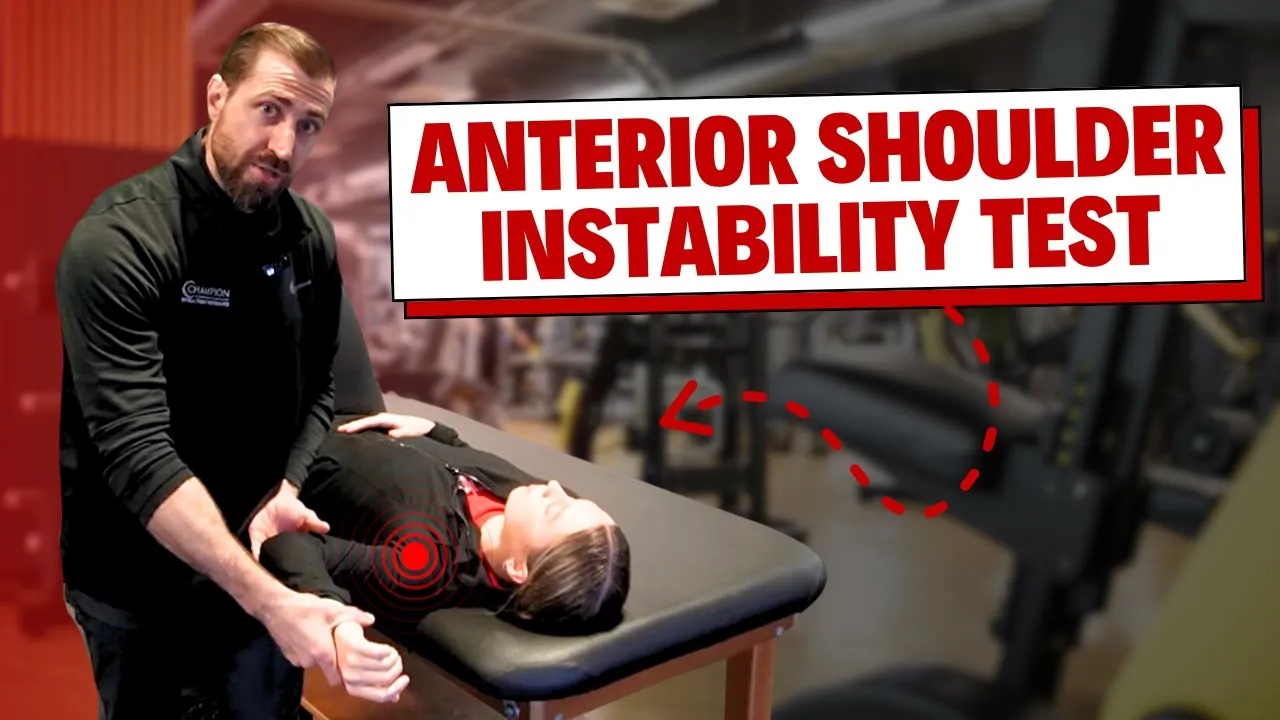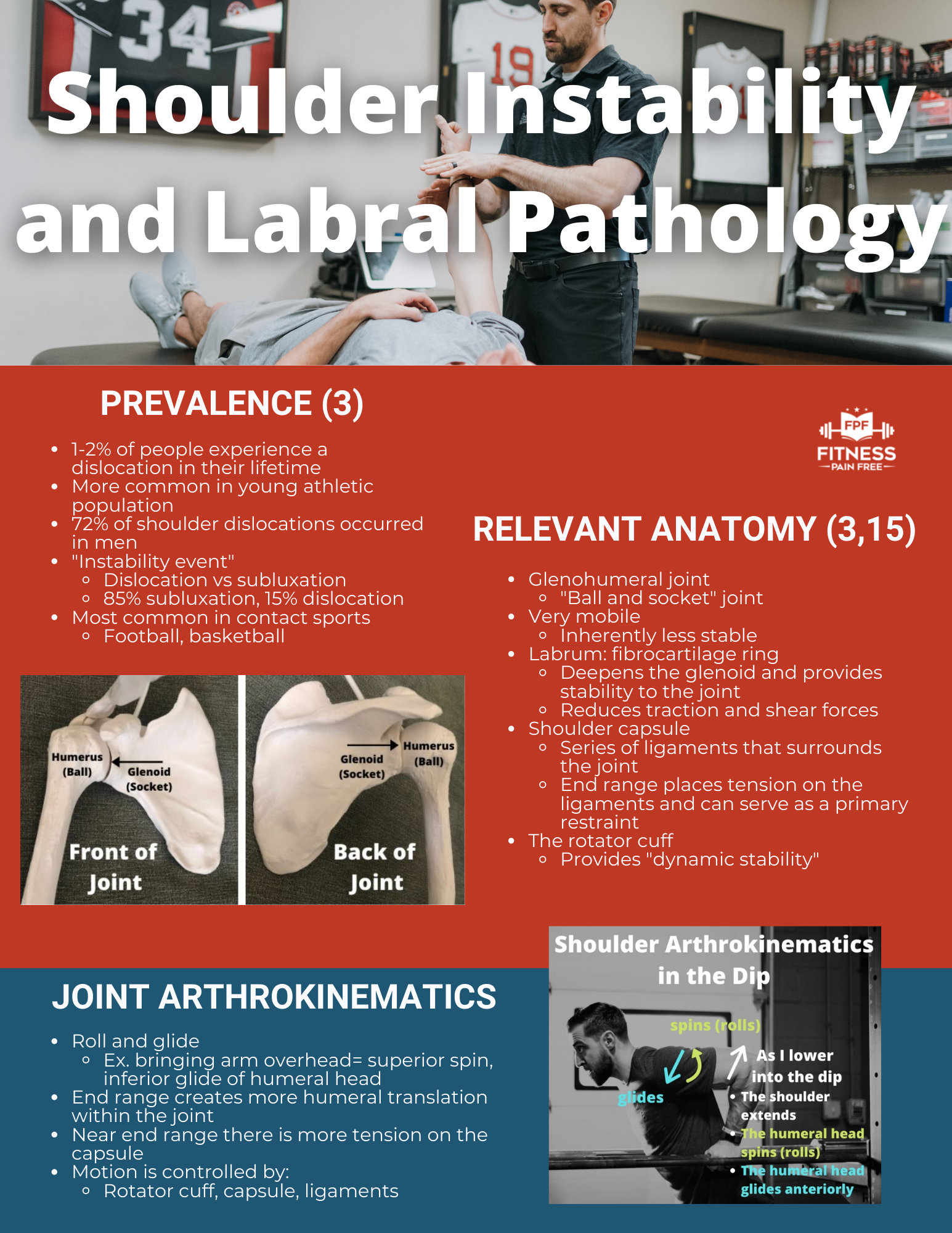
Anterior Shoulder Instability Clinical Examination [Physical Therapist Guide to Diagnosis]
To go along with today's episode I have a nice infographic to share...
Sign up to receive FREE: Shoulder Instability and Labral Pathology - The Evidence Based Cheat Sheet
Click HERE to Download FREE
Grab the rest of the Mini Course and Sign up for the Certification Pre-sale list:
- FPF Mini Course - 7 Reasons Why Injuries Happen in the Gym and What to do About it
- The Fitness Pain Free Certification
In today's video we go over Anterior Shoulder Instability Clinical Examination [Physical Therapist Guide to Diagnosis]:
Key takeaways for PTs:
- How to differentiate laxity from instability
- Mechanisms of injury leading to instability
- Importance of history taking and age considerations
- Performing a thorough range of motion assessment
- Special tests to assess instability (apprehension, relocation, etc.)******
Timeline:
- 0:00 - Intro
- 0:10 - Instability vs. Laxity
- 0:44 - Dislocation vs. Subluxation
- 1:15 - Bankart Lesions After Traumatic Dislocation
- 2:04 - Acquired Instability
- 2:33 - Multidirectional Instability
- 2:58 - Importance of a good diagnosis
- 3:29 - Who is most predisposed to injuries
- 5:10 - Age in relation to prognosis and plan of care
- 6:25 - Anterior shoulder instability / laxity testing
- 7:30 - Assessing ROM for apprehension
- 9:32 - Anterior apprehension test
- 10:12 - Relocation test
- 10:34 - Release test
- 11:35 - Anterior load test
- 11:58 - Anterior jerk test
- 12:25 - Anterior drawer test
Don't dislocate your patient's shoulder...
- Dan Pope DPT,OCS,CSCS
Show Notes / Relevant Articles:
- FPF Mini Course - 7 Reasons Why Injuries Happen in the Gym and What to do About it
- What Physical Therapists Need to Know about Shoulder Instability
- 6 Keys to Shoulder Instability Physical Therapy
- Case Study: Multi-direction Instability in a CrossFit (TM) Athlete
- Shoulder Instability Physical Therapy Exercises | Labral Tear, SLAP, Bankart | Open Chain
Want to support me and decide topics for future episodes? Click HERE to sign up for FPF "Insiders" for just a dollar. You'll gain access to 100+ webinars, e-books and complete guides. Plus, you'll get private access to the "Insiders" Facebook group where you can have all of your questions answered by me.
Looking for other ways to support me that are 100% free?
- Like, comment and share on youtube, facebook and instagram
- Leave a 5-star review on apple podcasts
Thank you!
Dan Pope DPT, OCS, CSCS
References:
- Novakofski KD, Melugin HP, Leland DP, Bernard CD, Krych AJ, Camp CL. Nonoperative management of anterior shoulder instability can result in high rates of recurrent instability and pain at long-term follow-up. J Shoulder Elbow Surg. 2022 Feb;31(2):352-358. doi: 10.1016/j.jse.2021.07.016. Epub 2021 Aug 25. PMID: 34454036.
- Duethman NC, Bernard CD, Leland D, Wilbur RR, Krych AJ, Dahm DL, Barlow JD, Camp CL. Multiple Instability Events at Initial Presentation Are the Major Predictor of Failure of Nonoperative Treatment for Anterior Shoulder Instability. Arthroscopy. 2021 Aug;37(8):2432-2439. doi: 10.1016/j.arthro.2021.03.047. Epub 2021 Mar 31. PMID: 33812027; PMCID: PMC8985112.
- Lizzio VA, Meta F, Fidai M, Makhni EC. Clinical Evaluation and Physical Exam Findings in Patients with Anterior Shoulder Instability. Curr Rev Musculoskelet Med. 2017 Dec;10(4):434-441. doi: 10.1007/s12178-017-9434-3. PMID: 29043566; PMCID: PMC5685956.

